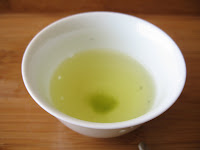 Tea:
Tea: Temomi-cha
Vendor: Sugimoto USA (Hopefully)Source: Japan
About this tea: Kyohei Sugimoto from Sugimoto USA was kind enough to send me a sample of this very special tea. Temomi cha is hand kneaded tea. From the needles to the used leaf, it is incredibly apparent the amount of effort and care that is put into this tea. When sencha was originally created this is the technique that was originally used. Before the conveyor belts for steaming and all that jazz. This temomi-cha was actually made by hand, by Kyohei's mother, Kazue Sugimoto. Since 1995 she has studied about the Temomi technique and strives to preserve the technique for future generations. She has even presented her Temomi cha to the Japanese Imperial Palace in 1997 and won 3rd place in a national Temomi contest in 2006. Now she is a licensed instructor teaching future generations about this technique.
Leaf: The leaf for this tea is gorgeous. Each leaf is rolled into a thin long narrow needle. There are no broken leaves, no dust, just long graceful needles. The leaf has an amazing aroma. The leaves have a deep sense of a sweet aroma. It reminds me almost of a sweet seaweed covered senbei that I used to eat as a child. The aroma on this leaf alone is enough to make this a memorable experience.
Brewing: The instructions provided with this tea were very different than any other tea that I have experienced. 10g of leaf are used per session. The first session is steeped for 2-3 minutes using only 2 ounces of water at 100F. Successive infusions are done for 1 minute at 130F.
 1st Infusion:
1st Infusion: The tea had a very cool and relaxing aroma to it. The flavor was thick and rich like a gyokuro, but with a sharp tang of bitterness. The bitterness was no shallow and stinging like an oversteeped sencha, but rather a strength to a complex flavor. The tea was very full bodied and had a medium sense of astringency. With every sip came a different flavor, a different view on a different aspect of the profile. Every sip was rich and creamy almost. From the second the tea touched my tongue I knew this was unlike anything else. There was a sense of astringency, but it was paired with the thickness of flavor that almost covered the astringency.
2nd Infusion: This infusion had a radiant yellow color to it. The flavor was thinner and crisper than the first. In a word it would be described as bright and vibrant. The flavor was still deep and complex, but the flavor was more concentrated into a sharp richness. There was a noticeable tongue drying level of astringency, but it seemed to be only my tongue that would feel dry. Normally something that could make my tongue feel that way would cause my whole mouth to feel dry. In this case it was just my tongue. Unlike a gyokuro there were not strong feelings of grassiness to this tea. It was a completely different rich set of flavors.
3rd Infusion: This infusion had a much lighter flavor to it. The taste was very crisp and light. At the same time though there was still that thick aftertaste to it and the aftertaste was still thick.
 Used Leaf:
Used Leaf: It was suggested that after the first few infusions that the leaves could even be eaten with a bit of soy sauce on them or salad dressing. I tried this, and the leaves reminded me of a spinach in flavor, just slightly chewier than boiled spinach. It was a very interesting flavor. And also after I had enjoyed the tea, I saw how well handled the leaves were. Having been harvested, processed, traveled around the world, steeped, and then viewed, they seem still a vibrant color of green, and very much intact with the edging of the leaf clearly the same as the day it was picked.
Rating: 10/10
Conclusion: This was a tea experience unlike any that I have tried before. When I first tried gyokuro the proper way I thought that it had just opened my eyes to something unimaginable. The same could be said for a delicious bowl of matcha. This takes the cake above both of those. The depth and complexity of the flavor is amazing. Unfortunately though Kyohei is unable to offer this amazing tea for sale yet, but they are planning to start offering it in 2009. I know that I for one am waiting for the day that this tea is available for sale. This is in no way though a tea that you would enjoy on a regular basis, it is definitely a very special occasion tea that is intended to be savored and enjoyed. Drinking this tea is very much akin to enjoying a rich and strong flavored espresso. This really is like drinking tea history. You will probably notice that I gave this tea a rating of 10+ / 10. Since it wouldn't really be fair to say anything above 10/10 to the rating scale, I came up with a 10+. This is beyond anything else that I have ranked as a 10.
 Tea: Shimizu
Tea: Shimizu 1st Infusion: This tea has a rather yellow colored infusion. The picture actually makes it appear greener than it really is. There was a roasted notion to the aroma. The flavor is medium bodied with a medium sense of bitterness and a light sense of astringency. The tea has a very crisp feeling to it. Aside from that it feels very generic.
1st Infusion: This tea has a rather yellow colored infusion. The picture actually makes it appear greener than it really is. There was a roasted notion to the aroma. The flavor is medium bodied with a medium sense of bitterness and a light sense of astringency. The tea has a very crisp feeling to it. Aside from that it feels very generic.




















